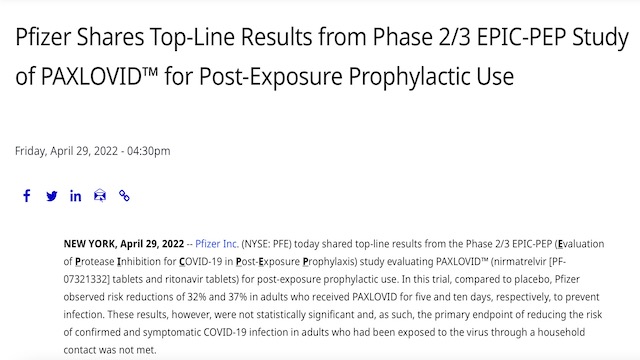Pfizer COVID-19 drug Paxlovid is not effective for post-exposure prophylaxis in adults
- Normal Liver Cells Found to Promote Cancer Metastasis to the Liver
- Nearly 80% Complete Remission: Breakthrough in ADC Anti-Tumor Treatment
- Vaccination Against Common Diseases May Prevent Dementia!
- New Alzheimer’s Disease (AD) Diagnosis and Staging Criteria
- Breakthrough in Alzheimer’s Disease: New Nasal Spray Halts Cognitive Decline by Targeting Toxic Protein
- Can the Tap Water at the Paris Olympics be Drunk Directly?
Pfizer COVID-19 drug Paxlovid is not effective for post-exposure prophylaxis in adults
- Should China be held legally responsible for the US’s $18 trillion COVID losses?
- CT Radiation Exposure Linked to Blood Cancer in Children and Adolescents
- FDA has mandated a top-level black box warning for all marketed CAR-T therapies
- Can people with high blood pressure eat peanuts?
- What is the difference between dopamine and dobutamine?
- How long can the patient live after heart stent surgery?
Pfizer’s oral COVID-19 drug Paxlovid is not effective for post-exposure prophylaxis in adults.
Paxlovid did not meet the primary study endpoint in reducing symptomatic infection in adults exposed to the virus through household contact.
On April 29, Pfizer announced a Phase II/III clinical (EPIC-PEP) study of its oral COVID-19 drug Paxlovid for post-exposure prophylaxis (EPIC-PEP), and the results showed that the drug was not effective for post-exposure prophylaxis in adults.
A total of 2,957 adults were included in the study who tested negative for the Covid-19 antigen and had been exposed to a symptomatic individual who tested positive for the antigen within 96 hours.
In adults who received PAXLOVID for 5 and 10 days, it was shown that the risk of infection prevention was reduced by 32% and 37%, respectively, compared with placebo, but these results were not statistically significant.
Therefore, Pfizer said that the drug did not meet the primary study endpoint in reducing symptomatic infection in adults exposed to the virus through household contact.

Paxlovid is a compound preparation of 3CL protease inhibitor and low-dose ritonavir, which is a small molecule oral COVID-19 drug.
From December 2021, the drug received emergency use authorization from the FDA for the treatment of non-hospitalized patients with mild to moderate COVID-19s at high risk of developing severe disease, including children over 12 years old and adults.
On February 11 this year, Paxlovid received conditional import approval from the China Food and Drug Administration for the treatment of adult to moderate COVID-19 patients with high risk factors for progression to severe disease.
In treatment, the drug shows better effect. Through comparative studies, it was found that the period of negative conversion of infected patients treated with antiviral drugs was significantly shortened, which also showed that the drug was safe and had no obvious side effects.
At present, under the Omicron epidemic, many infected people are asymptomatic or mild, mainly because these people have been vaccinated against the COVID-19 in the early stage. How to use small molecule oral COVID-19 drugs for post-exposure prevention is the direction that pharmaceutical companies are trying to break through.
Most of the mechanism of action of small-molecule oral COVID-19 drugs is to achieve the effect of eliminating the virus by interfering with the replication of the virus itself. In addition, convenient administration, easy production, storage and transportation are also a major advantage of this type of drug.
In the development of small-molecule oral drugs, 3CL protease inhibitors are based on the ability to inhibit the action of 3CL protease, thereby preventing a series of subsequent replication activities of the virus, which has become one of the hot directions that pharmaceutical companies are developing.
Some of the 3CL protease inhibitors currently under development have shown stronger antiviral activity than Pfizer’s PAXLOVID in some cell tests, but are there still opportunities for these drugs to be used for post-exposure prophylaxis?
Pfizer COVID-19 drug Paxlovid is not effective for post-exposure prophylaxis in adults
(source:internet, reference only)
Disclaimer of medicaltrend.org
Important Note: The information provided is for informational purposes only and should not be considered as medical advice.



